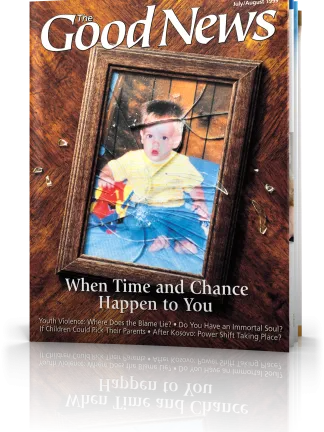Where Do We Go From Here?

Beyond Today Magazine
Good News Magazine: July - August 1999
Course Content
Rarely does a day go by when we don't read or hear of a senseless tragedy, a life cut short.
A drunk driver plows into a car, killing an entire family. A child drowns, ending a life that had scarcely begun. A lonely and troubled teenager ends her torment by taking her own life. A madman, heeding the call of his personal demons, guns down several people who happened to be in the wrong place at the wrong time. In a dusty, drought-stricken wasteland, a hungry mother cradles her emaciated son as the light slowly ebbs from his eyes.
We wonder at the meaning and the randomness of it all and think to ourselves that we're glad it wasn't us.
The Good News is dedicated to answering the big questions of life: Why are we here? Where are we going? Is there a God, and if so why does He allow suffering and tragedies? What do we face at the end of this life?
Regardless of our hopes and dreams, one thing's for sure: We all face the certainty of death. Whether through illness, accident, random violence or old age, we will die.
What does this mean? Is death the end? Is life a brief moment of consciousness in an eternity of nothingness?
The late astronomer and author Carl Sagan wondered about these questions as he saw his own death approaching. "I would love to believe that when I die I will live again, that some thinking, feeling, remembering part of me will continue," he said. "But, much as I want to believe that, and despite the ancient and worldwide cultural traditions that assert an afterlife, I know of nothing to suggest that it is more than wishful thinking."
Is this what we have to look forward to?
Dr. Sagan, like thousands of scientists before and since, spent decades trying to discover the meaning of life and how it began, but without success. In spite of his brilliance, he spent his life looking for answers in all the wrong places.
He didn't heed the advice of King Solomon, whose words speak to us from antiquity and reveal to us where we should begin our search for answers to the great questions. "The fear of the Lord is the beginning of wisdom, and the knowledge of the Holy One is understanding," he wrote (Proverbs 9:10).
To understand what happens after death, shouldn't we look to the words of the One who gave us life? Wouldn't the Creator of life be the One best to explain the mystery of death?
Over the millennia mankind has evolved all kinds of ideas about the possibility of life after death. Millions believe in reincarnation, that they will live again with a new human or animal body. Millions more believe we possess immortal souls, that though our physical bodies may die our souls live forever.
Many believe we are destined for eternal bliss in heaven or everlasting torment in hell. Some think God predestined each of us for one of those fates, that, regardless of our words and deeds, at death some will receive eternal ecstasy and others eternal agony.
Such beliefs, however, raise even more questions. For example, why would anyone want to worship a God who would willingly and deliberately torture some of His children in hell forever?
Many people are shocked to find their beliefs about what happens after death aren't found in the Bible at all but came from philosophers and pre-Christian religions. Such beliefs often paint a distorted view of God and His purpose for us.
Where do we go from here? That's a good question, and you need to know the answers. A good place to start is in the pages of your Bible and this issue of The Good News. GN



